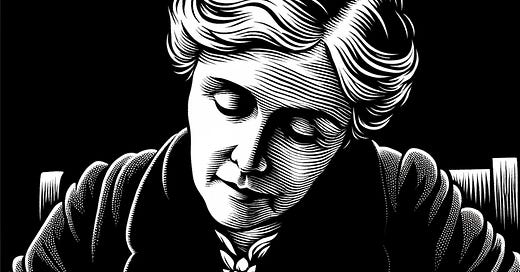Evelyn Underhill: Bridging Belief to Deeper Truths
You don't need to scrap your present outlook, but include it in something greater
This week’s letter by Evelyn Underhill1 begins philosophical and ends practical. I love the way she guides her directee away from a belief she doesn’t hold. Notice she doesn't criticize her correspondent for believing in Pantheism but instead encourages her to use it as a stepping stone. That is, she doesn’t knock down beliefs, she builds on them. This respectful approach is refreshing. Don’t miss her thoughts on the Incarnation too — it’s a helpful counterpoint to what we typically hear in Western Evangelical circles. Finally, her advice at the end is simple and achievable (and I even link to the books she recommends). The balance between elevated philosophical thought and grounded, daily guidance resonates. For me, it’s spiritual direction at its best. I’d love your thoughts in the comments below.
June 20, 1924
To W.Y.,
I was so pleased to hear from you again; for you have remained in my mind since your previous letter.
I think your "practical" difficulty is really a mental and spiritual difficulty. That is to say it arises out of the inadequacy of your present religious and philosophic outlook. You have arrived at a sort of pantheistic belief and experience and have discovered – as I think nearly every sincere person must discover sooner or later – that it provides no real incentive or sanction whatever for moral effort, and yet you can't get away from the feeling (I think) that moral effort is part of your job!
What you are really short of is the conviction of personal responsibility to a personal God – and pantheism of course can never give you that. It means genuine theism and preferably Christian theism – the true co-ordinating factor of our aesthetic and ethical life.
Of course such a realization of the Divine in and through nature, as you describe, is religious as far as it goes: but it isn't a sufficient religion for the human soul, which absolutely requires a relationship with a personal object in which its own partial and imperfect personality is summed up and made complete. This does not mean scrapping your present outlook, but including it in something deeper and greater.
And (as regards specifically Christian beliefs) it means getting beyond the idea of Christ as a "perfect example," "spiritual genius" and so forth, to a realization of the principle of incarnation (and as a derivative therefrom, of sacramentalism also) as involving the special self-expression and self-imparting of the Infinite God, in humanity and for humanity.
If you will, as it were, let such ideas as these dwell in your mind, regard them favourably, be willing for them to be true, I think it probable that your religious attitude will gradually develop in the theistic direction and you will then find the clue and incentive you feel you need.
But it does seem to me that you ought to try to pray.
Your spiritual sense won't develop unless you give it education. I think you ought to take a short, regular time for this every day – perhaps only 10 minutes in the morning at first.
Even if it begins merely as you say with reading a Psalm and "feeling transported."
That is not mere self-indulgence, but quite a good preparation for subsequent objectivity and hard work.
Hold on to this sense of peace and beauty, and in and with that, consider the duties, etc., of the day: surround them with that atmosphere as much as you can – and don't expect any very startling results at first!
I wish you would read (if you have not already) Otto's The Idea of the Holy and Baron von Hugel's Essays and Addresses - especially the one on the "Natural and Supernatural" for I think you would find them illuminating.2
Evelyn Underhill was a renowned English writer and theologian, best known for her extensive work in Christian mysticism and spiritual practice. Her writings, deeply rooted in her Christian faith, emphasized the importance of personal spiritual development and the quest for a deeper understanding of the divine. As a spiritual director, she guided many in their spiritual journeys, offering insights drawn from her rich experience in prayer and contemplation. Underhill's profound influence on Christian spirituality is often encapsulated in her beloved quote: "God is always coming to you in the Sacrament of the Present Moment. Meet and receive Him there with gratitude in that sacrament.”
Underhill, Evelyn. The Letters of Evelyn Underhill. United Kingdom: Darton, Longman and Todd, 1991.




